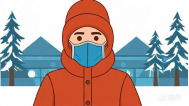冬季为何是感冒高发的季节?

You’ve probably heard “Don’t go outside in the winter with your hair wet or without a coat; you’ll catch a cold.” That’s not exactly true. As with many things, the reality is more complicated. Here’s the distinction: Being cold isn’t why you get a cold. But it is true that cold weather makes it easier to catch respiratory (呼吸的) viruses such as the cold and flu.
Virus transmission is easier when it’s cold. More specifically, cold weather can change the virus’s outer layer, making it tougher and more solid. Scientists believe that makes person-to-person transmission of the virus easier.
It’s not just cold winter air that causes a problem. Air that is dry in addition to cold has been linked to flu outbreaks. That’s because dry winter air further helps the virus to remain infectious longer. Dry air, which is common in the winter, causes the water found in respiratory droplets to evaporate (蒸发) more quickly. This results in smaller particles, which are capable of lasting longer and traveling farther after you cough or sneeze.
Also, most people get less sunlight in the winter. That is a problem because the sun is a major source of vitamin D, which is essential for immune system health. Physical activity, another factor, also tends to drop during the winter. People are three times more likely to delay exercise in snowy or icy conditions.
Instead, people spend more time indoors. That usually means more close contact with others, which leads to disease spread. Respiratory viruses generally spread within a 6-foot radius of an infected person.
Moreover, cold temperatures and low humidity can dry out your eyes and the mucous membranes (黏膜) in your nose and throat. This makes it easier for viruses like those causing colds, and flu to attach when you breathe them in.
What can you do? There are strategies to help prevent illness all year long.
原创编写 版权所有 侵权必究! 每日更新 个性化阅读 英语飙升!